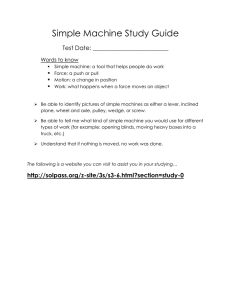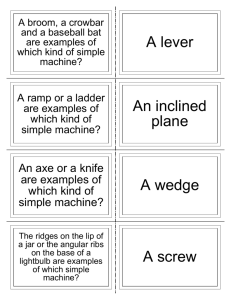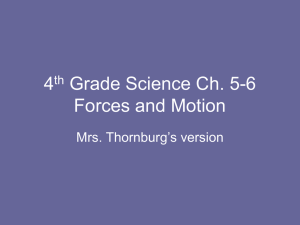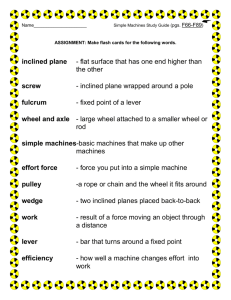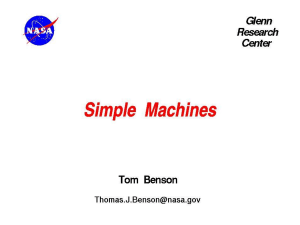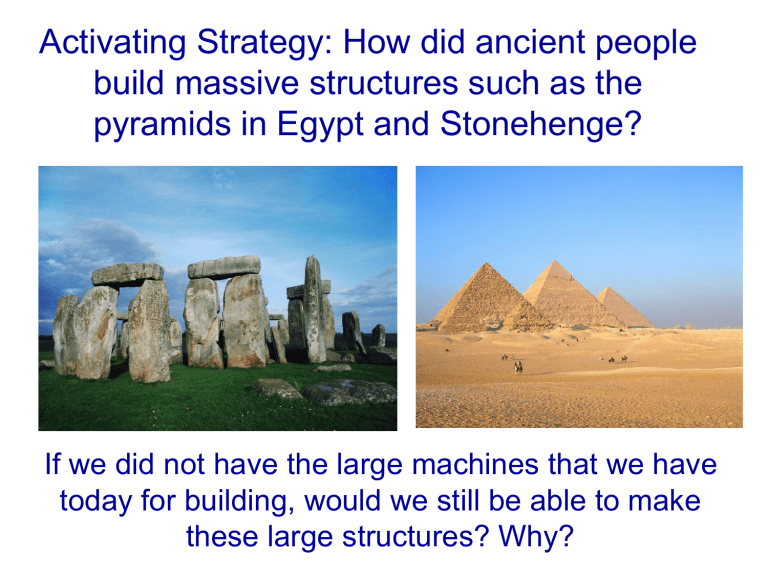
Activating Strategy: How did ancient people build massive structures such as the pyramids in Egypt and Stonehenge? If we did not have the large machines that we have today for building, would we still be able to make these large structures? Why? Essential Question: How do simple machines make life easier for us? Standard: S8P3c. Demonstrate the effect of simple machines (lever, inclined plane, pulley, wedge, screw, and wheel and axle) on work. 2 Use the Simple Machines Notes Sheet during the lesson. Be sure to draw illustrations for each concept shown on the notes sheet. 3 Work is when an applied force causes an object to move in the direction of the force. 4 Suppose you try to push a brick wall over. Is this considered work? Why or why not? 5 No. Work is done only when an object moves in the same direction of the force that is being applied. With your seat partner, list two examples of work and two examples of NO work. 6 http://www.classzone.com/books/ml_scienc e_share/vis_sim/mfm05_pg113_work/mfm 05_pg113_work.html What did you notice in the simulation? 7 Work = Force x distance W=Fxd 8 A machine is a device that makes work easier by changing the size or direction of a force. Look at the list below and identify which are considered machines: • Can opener • Doorknob • Brake • Knife 9 Machines There are simple machines and complex machines Complex machines have 2 or more simple machines There are six (6) types of simple machines: inclined plane, wedge, screw, lever, pulley, and wheel and axle 10 Inclined Plane 11 Inclined Plane Straight, slanted surface Makes work easier because it is easier to move something to a higher or lower place 12 With your seat partner, identify at least 3-4 examples of an inclined plane. 13 Inclined Planes Steps Sloping Roads Bathtub Ramp 14 Inclined Planes Other examples: http://www.mikids.com/SMachinesIn clinedPlanes.htm Playground slide, ski jump, animal ramp, wheelchair ramp, etc. 15 Add these and any other examples of inclined planes to your Simple Machines Graphic Organizer. 16 Wedge 17 Wedge Inclined plane that moves Two inclined planes joined back to back Wider or thicker at one end than at the other Makes work easier because when moved, a wedge cuts, splits, or pries apart objects (including air and water) 18 With your seat partner, identify 34 examples of a wedge 19 Wedge Axe Knife Zipper Boat Stern Bottle Opener 20 Wedge Other examples: http://www.mikids.com/SMa chinesWedges.htm Door stop, forklift “forks”, teeth 21 Add these and any other examples of a wedge to your Simple Machines Graphic Organizer. 22 Screw 23 Screw Thread Inclined plane wrapped around a cylinder with a wedge at the tip Makes work easier because it applies lots of force with little effort Makes work easier because it is used to hold things together 24 Think, Pair, Share Identify 3-4 examples of screws Do more threads on a screw make work easier or harder? Why? Why might a screw be called a complex machine? 25 Screws Swivel stool Jar lid Drill bits Cork screw 26 Screw More threads on a screw make it easier to turn, but it takes longer A screw might be called a complex machine because it has both an inclined plane and a wedge at its tip 27 Add these and any other examples of a screw to your Simple Machines Graphic Organizer. 28 Lever 29 Lever Made up of a bar that pivots at a fixed point called a fulcrum Force applied to a lever is called the effort Object moved is the load Three classes of levers 30 Levers-First Class In a first class lever the fulcrum is in the middle and the load and effort is on either side 31 With your seat partner, list 3-4 examples of a First Class Lever. 32 Levers – First Class Seesaw Hammer’s claws Shovel Scissors 33 Add these and any other examples of a first class lever to your Simple Machines Graphic Organizer. 34 Levers-Second Class In a second class lever the fulcrum is at the end, with the load in the middle 35 Levers – Second Class Stapler Wheelbarrow Nut cracker 36 Add these and any other examples of a second class lever to your Simple Machines Graphic Organizer. 37 Levers-Third Class In a third class lever the fulcrum is again at the end, but the effort is in the middle 38 With your seat partner, list 3-4 examples of a Second Class and Third Class Lever. 39 Levers – Third Class Tongs Fishing Pole Broom Tweezers 40 Add these and any other examples of a third class lever to your Simple Machines Graphic Organizer. 41 Other examples of levers: http://www.mikids.com/SMachinesLevers.htm Critical Thinking: What is the relationship between the location of the fulcrum in a lever and effort? The closer the fulcrum is to the load, the less effort you will need 42 Types of Levers Task Rotation [see resources] 43 Wheel and Axle 44 Wheel and Axle Consists of two circular objects of different sizes A wheel is connected to a post (axle) Wheel is larger than the axle Makes work easier because it applies more force or lifts a heavy load with less effort 45 With your seat partner, list 3-4 examples of a Wheel and Axle. 46 Wheel and Axle Door knob Well crank Wrench and bolt Steering wheel 47 Add these and any other examples of a Wheel and Axle to your Simple Machines Graphic Organizer. 48 Pulley 49 Pulley Wheel and axle with a groove around the outside A pulley needs a rope, chain or belt around the groove to make it do work Pulley systems can consist of one or more fixed pulleys, one or more moveable pulleys, or both fixed and movable pulleys. Makes work easier by changing the direction of the force or multiplying the effort used 50 With your seat partner, list 3-4 examples of a Pulley. 51 Pulley Flag Pole Ski Lift Clothesline 52 Add these and any other examples of a Pulley to your Simple Machines Graphic Organizer. 53 Complex Machines Simple Machines can be put together in different ways to make complex machines 54 Optional Activities Simple Machine Scavenger Hunt Simple Machines Category Cards What Would You Use? Handout Rube Goldberg Projects Pinball Wizard Simple Machines Target Practice Simple Machine 55 Summarizing Strategy http://www.youtube.com/watch?v=8H41zbqrwVo 56
